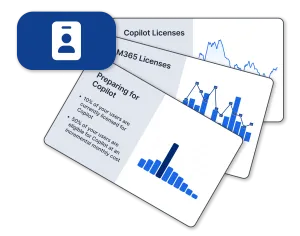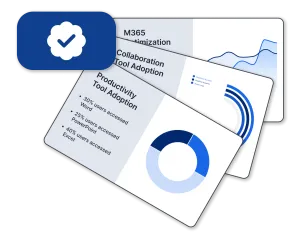It's been nearly a year since Copilot for Microsoft 365 became generally available, and the pressure to adopt this transformative tool has only mounted.Since its release, organizations worldwide have rapidly adopted Copilot, driven by its continually expanding features and capabilities. Recent updates include priority access to the GPT-4 Turbo, expanded image generation and enhanced functionalities in SharePoint and Teams.But regardless of all the hype, business leaders are facing questions:Is your business ready? Do you have the right licensing and security requirements? Most importantly: Will Copilot pay off?The key to success comes down to having the right tools, processes and people in place. So, how do you make sure your business has what it needs for a successful Copilot launch?In this article we outline why you need to assess your Copilot for Microsoft 365 readiness. We’ll also explain the risks to rushing in, challenges to finding answers and how tools such as Block 64’s Copilot Readiness Assessment can help.
The Challenges of Deploying Copilot for Microsoft 365
The path to successful Copilot implementation is fraught with challenges and resource-intensive demands:
- Complex Security Requirements: Ensuring security compliance is paramount when getting ready for Copilot. Adopting a Zero Trust security model is required – and that demands rigorous adherence to security policies and standards. Evaluating and addressing vulnerabilities in your IT environment is critical to protect data, networks, and applications from potential threats.
- Intricate Licensing Demands: Understanding and managing licensing requirements for Copilot can be daunting. Accurate data on your current licensing status is necessary to identify gaps and optimize costs. Given that Copilot requires specific Microsoft 365 licenses and additional fees, a thorough analysis ensures that your investment aligns with organizational goals and maximizes ROI.
- Deep Understanding of Current Productivity Tool Usage: Maximizing the benefits of Copilot hinges on the effective use of existing productivity tools. Assessing current usage patterns of applications like Teams and OneDrive is essential to ensure they are being utilized to their full potential. This analysis helps identify areas for improvement, driving better adoption rates and preventing resource wastage.
Why Readiness Matters: The Real Risks of Unprepared Adoption
Rushing into Copilot adoption without proper preparation can lead to several serious consequences:
- Wasted Investment and Slowed Innovation: Choosing an inappropriate pilot group can lead to poor adoption rates and misleading feedback, which may derail your entire AI initiative. Additionally, investing in tools that are not fully utilized squanders resources and fosters skepticism towards future technology adoptions, ultimately stalling innovation.
- Security and Compliance Risks: Inadequate security measures significantly heighten the risk of data breaches and intellectual property theft, exposing the organization to substantial vulnerabilities. Furthermore, non-compliance with regulatory standards can result in severe financial penalties and reputational damage, underscoring the need for robust security protocols.
- Operational Disruption: Improper integration of Copilot with existing workflows can lead to decreased productivity rather than the intended improvements. Without proper planning, these disruptions can cause underutilization of the tool and increase the burden on IT support, counteracting the benefits of adopting the new technology.
- Missed Opportunities: Failing to identify high-impact use cases restricts the potential return on investment, as the most beneficial applications of the technology are overlooked. Additionally, an inability to scale the solution effectively means the organization misses out on significant competitive advantages that could be gained through broader adoption.
Introducing Block 64's Copilot Readiness Assessment
To navigate these challenges and mitigate risks, Block 64 has developed the Copilot Readiness Assessment. This powerful tool provides a comprehensive analysis of your organization's readiness for Copilot adoption in just 15 minutes of setup time.What the assessment covers:1. Security Evaluation:

- Assesses your M365 and Azure Secure Scores against Microsoft's recommendations
- Identifies potential oversharing risks and sensitive data exposure
2. Licensing Analysis

- Evaluates your current licensing status and identifies gaps
- Helps you understand Copilot-ready licenses and considerations for frontline workers
3. Usage Optimization

- Analyzes your current usage of collaboration tools and Copilot-integrated applications
- Identifies opportunities for improved adoption and productivity gains
The Outcome: Actionable Insights
Upon completion, you'll receive a detailed, multi-page report packed with data-driven insights, recommendations and alerts, including:
- Your organization's overall Copilot readiness score – with detailed steps to remediate security and licensing gaps
- A shortlist of recommended users for your pilot program, based on the most likely group to deliver maximum impact
- Estimated human hours saved in one year by implementing Copilot
- Clear recommendations for improving your readiness and maximizing ROI
Getting StartedEmbarking on your Copilot readiness journey is simple.Simply visit our Copilot Readiness Assessment sign up page and follow the steps.In the race to harness the power of generative AI, proper preparation is your strongest ally. Block 64's Copilot Readiness Assessment provides the clarity and insights you need to make informed decisions, reduce risks, and pave the way for a successful Copilot for M365 implementation.Don't leave your GenAI future to chance. Get your Copilot Readiness assessment started in just 15 minutes and take the first step towards transforming your organization's productivity.Start Your Copilot Readiness Assessment Now